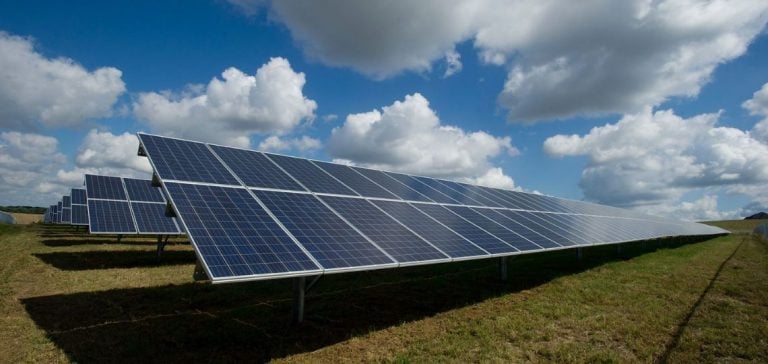Renewable Land, an investment company specializing in energy projects, has just completed a transaction to acquire 435 acres located in Putnam County, Ohio.
The land is currently leased to Blue Harvest Solar Park, a 50-megawatt solar installation operated by EDP Renewables.
The park supplies part of the electricity needed by Amazon’s infrastructure, including its AWS data centers and U.S. offices.
The project is part of a wider drive by the technology company to power all its activities with renewable energy.
It also underlines the growing importance of strategic land acquisitions in the renewable energy sector, where the need for suitable land for large-scale solar or wind farms is rising sharply.
This acquisition reinforces Renewable Land’s strategy of focusing on long-term, stable energy projects.
The challenges of land acquisition for solar energy
In the current context of energy transition, demand for sites suitable for solar or wind power projects continues to grow.
The acquisition of land by companies such as Renewable Land reflects this dynamic, and is part of a strategy aimed at guaranteeing a stable, long-term return on investment.
The nature of these contracts, which are often long-term, enables investors to secure income while participating in the expansion of renewable energies.
The Blue Harvest solar farm is a typical example of this new energy economy.
By directly powering Amazon’s infrastructure, this project embodies the commitment of major corporations to decarbonizing (reducing CO2 emissions) their activities.
Demand for sustainable energy sources continues to grow, and partnerships between private players like Amazon and specialist energy companies such as EDP Renewables demonstrate the importance of such collaborations in the development of a modern energy infrastructure.
Amazon and renewable energy: a strategic partnership
Amazon, through its commitment to carbon neutrality, plays a crucial role in the demand for green electricity.
By sourcing from solar farms such as Blue Harvest, the company ensures business continuity while meeting its environmental objectives, without compromising the performance or stability of its operations.
Amazon’s strategy of powering all its infrastructure with renewable energy by 2025 directly benefits energy operators like EDP Renewables.
The latter currently manages a wide range of solar and wind projects around the world, and the Blue Harvest facility in Ohio joins a growing list of sites supplying energy to major corporations.
The revenues generated by green electricity supply contracts ensure the viability of solar projects, while supporting the growth of the infrastructure required for the energy transition of technology giants.
Renewable Land: a long-term strategy
As a purchaser of land for renewable energy projects, Renewable Land takes a cautious, calculated approach.
Rather than focusing solely on immediate profitability, the company strives to develop a land portfolio that supports diversified energy projects.
With long-term leases, such as the one signed with EDP Renewables, Renewable Land secures stable revenues over several decades.
This strategy also meets the expectations of investors, who are looking for both financial returns and a positive impact on the renewable energy sector.
The acquisition of land for solar or wind power projects is thus becoming a pillar of profitability in the sector.
Companies specializing in this field benefit from the growing demand for energy infrastructure, while actively participating in the global energy transition.
These acquisitions help to secure the energy supply of major groups, while strengthening the position of investors in the energy landscape.
Prospects and challenges for solar projects
The market for renewable energies, particularly solar farms, continues to grow rapidly in the United States.
However, challenges remain.
The main obstacle remains the availability of suitable land for large-scale installations.
In addition, the often complex regulatory framework requires energy companies to navigate through a multitude of local, state and federal rules before they can begin operating projects.
Despite these constraints, investment in the solar sector continues unabated.
The desire of major corporations to diversify their energy sources and minimize their carbon footprint is driving continued demand for these infrastructures.
Market players such as Renewable Land and EDP Renewables are well positioned to meet this growing demand, developing viable projects and guaranteeing stable supplies for corporate customers.






















